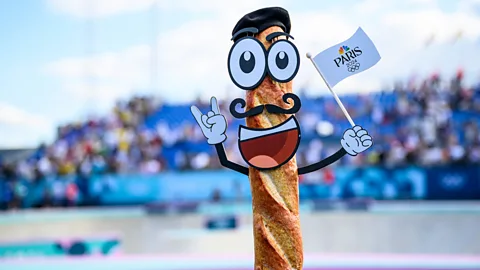The race to plant-based food: How the Paris Olympics became the most vegan ever
 Getty Images
Getty ImagesThe Paris Olympics' pledged to double the amount of plant-based food on offer. But prioritising planetary health alongside sporting prowess has involved balancing different interests.
Music, romance and regicide: the opening ceremony of the Paris Olympics was a riot of French ions. Among them was food, with a naked Dionysus, the Greek God of wine and festivity, sprawled with Bacchanalian abandon among a pile of produce. Another was revolution, taking the form of a gory Marie Antoinette, the beheaded 18th-Century queen, peering down from her historic former prison.
Recently however, these two French themes – of food and political fury – have combined, and dietary choices have become a source of intense and growing protest.
Early in 2024, hundreds of French farmers, angry about falling incomes and rising bureaucracy, took to their tractors to block major highways. "Mangez Francais", meaning "eat French", was spelled out in parked trucks, and dozens of protesters were arrested after attempting to besiege a food market outside the capital.
A few weeks later, a very different set of French food activists descended on the Louvre Museum within the city. Two of the climate action collective Riposte Alimentaire (Food Retaliation) marched inside and sprayed pumpkin soup over the Mona Lisa. Their demands included the "right to healthy and sustainable food", and increased awareness of the toll on the planet taken by the food sector.
After a clean-up, the painting's famous smile remains as inscrutable as ever. Yet these battles over the future of food are neither new nor isolated, and have involved breaking a lot of eggs. Two years ago, it was cake that was hurled at the Mona Lisa as a protester urged people to "think of the Earth", while the farmers' protests have been taking place across Europe for over 12 months.
 Getty Images
Getty ImagesAdvocates from the two movements can often feel at odds, with calls to reduce emissions-intensive meat-eating clashing with the agricultural sector's demand for greater for its animal products. Even the words used to describe plant-based meat alternatives have resulted in tension between the French government and the top istrative court.
Far from ignoring these controversies, however, the 2024 Olympic Games in Paris dived right in – and offered a different, more conciliatory approach. Instead of pitting environmental needs against farmers' interests, they have attempted to protect the concerns of both, via pledges to increase the meat-free options and boost the amount of French-sourced produce.
"You can't just say: 'We don't want any more burgers made of beef.' That's just not possible," says Philipp Wurz, the Paris Games' head of food. "You have to be a bit more polite and say 'Okay, I want to propose alternative solutions. I want to have both.' Because there will be some menus where we have this item, [and also some] that propose alternatives, like a chicken burger, and a vegan, or vegetarian burger.
"We got some from the meat lobby, asking, 'Why are you doing this? Can you explain">window._taboola = window._taboola || []; _taboola.push({ mode: 'alternating-thumbnails-a', container: 'taboola-below-article', placement: 'Below Article', target_type: 'mix' });
